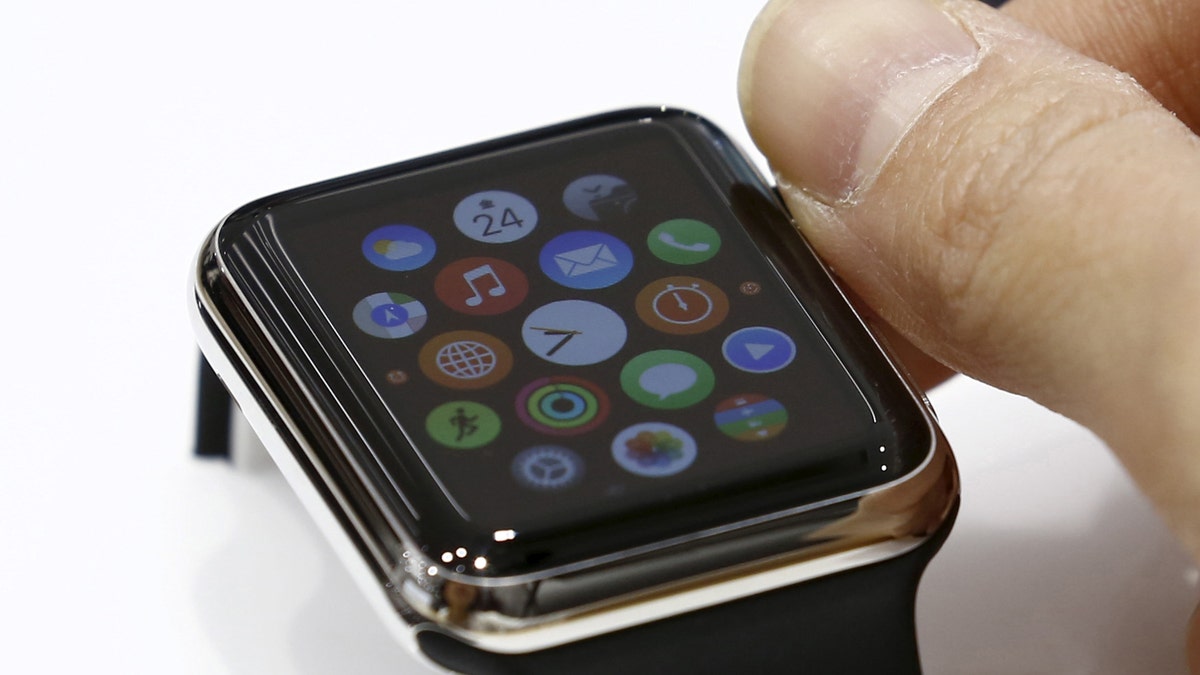
File photo - A woman uses Apple Watch that is on display at an electronics store in Omotasando in Tokyo April 24, 2015. (REUTERS/Thomas Peter)
A former Food and Drug Administraton official contends the agency's oversight is getting in the way of Apple's ability to develop medical products on its iPhone and Apple Watch.
In a post this month on American Enterprise Institute website, Dr. Scott Gottlieb argues that the company has worked to avoid FDA oversight, limiting the potential of its health-related offerings.
Related: Wearables like Fitbit, Apple Watch are popular holiday buys
"As Apple advances the medical promise of its watch and smartphones, it has also made clear that its foremost aim is to steer clear of Food and Drug Administration regulation," Gottlieb wrote. "Many assert that this imperative has rendered the health features in its sensor-laden watch underwhelming."
Apple CEO Tim Cook alluded to the FDA regulations recently in an interview with The Telegraph, where he acknowledged that the company doesn't "want to put the watch through the Food and Drug Administration process."
"I wouldn’t mind putting something adjacent to the watch through it, but not the watch, because it would hold us back from innovating too much, the cycles are too long," he said.
An Apple spokesperson did not respond to a request for comment on the issue.
Related: iPhone 6s Plus review: One fast smartphone
The FDA put out guidance earlier this year aimed at detailing what types of digital tech would be subject to review. As a result, Gottlieb claims that many app developers will have to come to the FDA first before getting too far.
"More than likely, FDA will give its usual advice that most of the complex questions will be 'review issues' that the agency will consider later," Gottlieb wrote. "This ‘we’ll know when we see it’ approach to regulation leaves innovators in perpetual limbo. It’s a formula for scaring away digital entrepreneurs, who can easily plumb their programming skills in other areas of commerce."
The FDA, however, said its oversight will not be broad and that its regulations will focus on "a small subset of mobile apps that are medical devices and present a greater risk to patients if they do not work as intended."
"This means the FDA does not intend to enforce regulations for the majority of mobile apps that meet the definition of a medical device," the FDA told FoxNews.com in a statement.
"We are regulating the functionality of the app based on risk to the patient, not the platform on which it runs," it said. "The FDA is committed to policies like this, which seek to balance patient safety while encouraging innovation."
In the FDA's Mobile Medical Applications Final Guidance, it cites examples such as "mobile apps that control medical devices [including] apps that provide the ability to control inflation and deflation of a blood pressure cuff (wristband) through a mobile platform and mobile apps that control the delivery of insulin...by transmitting control signals to the pumps from the mobile platform."
However, Gottlieb said the Guidance also covers apps that store or analyze patient-specific medical data.
"FDA has said it doesn’t intend to regulate 'general wellness' apps and mobile tech, like fitness and calorie trackers. But if these platforms make disease-specific claims, FDA wants to review them. When does an app cross that line?" Gottlieb wrote. "Any time it does something smart. Envision a nutrition app that counts your calories and tracks how your diet might raise or lower your risk for diabetes, or cause blood sugar surges. Or an app that helps correlate your symptoms with a list of probable causes."
Related: The Apple watchOS 2 software update: Wallet, better Wi-Fi calls and more
The Mobile Medical Applications Final Guidance, while nonbinding, represents the agency’s thinking on the issue and outlines how the FDA intends to enforce pertinent regulations, the FDA told FoxNews.com.
Alex T. Krouse, an associate at the law firm Krieg DeVault who is part of its Health Care and Business Practice Groups, said one of the most important guidelines is how Apple presents the device to the public.
"The iPhone is a device that has applications that may perform … these intended uses, but the iPhone itself is not marketed in such a way that would avail itself to FDA oversight at this point,” he said, in response to an email query. However, if “Apple developed a device claiming it cured or assisted in preventing a certain disease, this could certainly fall under the purview of the FDA,” he added.
In fact, app developers, not Apple itself, would be the ones to take on this kind of highly specialized development. And there’s the rub, according to Krouse.
“Regardless of the outcome, the FDA must address this issue because the mobile application industry is expanding at an alarming rate,” he writes in a paper entitled “iPads, iPhones, Androids, and Smartphones: FDA Regulation of Mobile Phone Applications as Medical Devices” for the Indiana Health Law Review.
“For the United States to remain competitive, the process needs to be more streamlined so that developers within the industry know where they stand,” he concluded.








































